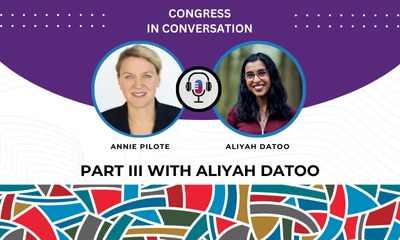Can we ensure social and economic rights as we rebuild from the COVID-19 pandemic? That’s what Dr. Christine Vézina, Law Professor at Laval University, thinks.
In the second Big Thinking seminar of Congress 2022, presented in French, Dr. Marcel Martel of York University introduced Dr. Vézina for a presentation on how Canadians and Quebeckers could seize the mechanisms of law and solidarity to make sure people are not only “free” post-pandemic, but are housed, fed, and well-cared for by a public healthcare system. That is, that their social and economic rights are met.
Vézina noted that Canada has been a signatory to the International Covenant on Economic, Social and Cultural Rights (ICESCR) since 1976, but has never lived up to its obligations. These violations are what Vézina calls “crimes of insolidarity,” or failures to address social and economic rights. In Canada and Quebec’s case, Vézina identifies three main failures: healthcare, poverty, and marginalization, all of which have been exacerbated by the pandemic.
Though Canada has had infrastructure in place since the 1960s to preserve social and economic rights – programs like public healthcare, for example – they have nonetheless been eroded since the 1980s.

Dr. Christine Vézina
In healthcare, this has caused problems like regional disparities, lack of primary care options, and a “productivist” view of medical care.
In the case of poverty, people on social assistance, even when accounting for tax credits, only make about half of what it takes to meet basic needs. Those on social assistance continue to be some of the most stigmatized people in a society that continues to distinguish between “good” and “bad” poor people. Vézina also notes that the minimum wage, despite recent rises, allows a full-time worker just enough to survive, but not nearly enough to escape poverty.
The most marginalized people in Canada are sex workers, intravenous drug users, and the homeless. During the pandemic, the number of unhoused individuals doubled in Montreal, and there is insufficient social housing. Drug users, faced with the opioid crisis, find access to low-threshold treatment a problem. And sex workers have no social safety net because of criminalization.
The COVID-19 crisis has made these “crimes of insolidarity” more visible. Previous violations of social and economic rights, like lack of decent healthcare, caused a knock-on effect where our individual liberties had to be curtailed, such as by lockdowns. Sex workers had no emergency income support, and so continued to work, increasing risk of COVID-19 transmission everywhere, but especially among the most vulnerable.
But because of this, the crisis also brought together new relationships and new communities of interest. Some walls between the excluded and others have fallen, and some bonds of reciprocity and emergency solidarity emerged, like in hospitals. Vézina says this “pragmatic solidarity” can become the “fertilizer” for a revival of economic and social rights.
This solidarity moment can finally shake up the status quo in Canada and Quebec, Vézina says, which has been resistant to economic and social rights, despite its international legal obligations. The ICESCR imposes obligations on states that should be implemented immediately, like non-discrimination and meeting basic needs. Maximum resources must be mobilized, such as through taxation. Allowances must be made for different people’s realities, with a focus on the most vulnerable.
Vézina knows this panoply of obligations continues to be confronted with strong resistance. In Canadian and Quebec law, this resistance is produced and reproduced by a hegemonic paradigm of civil and political rights over social and economic rights. But there are many alternatives to change the status quo.
It is up to legislators, judges, governmental lawyers, NGOs, community organizations, and residents themselves to ensure social and economic rights post-pandemic. We need to find a framework that fits into the social and economic rights framework. Vézina says there are many possible strategies to bring social and economic rights to fruition, and in this sense, she invites citizens to engage with this struggle for the common good.
When we observe the world as it existed before the pandemic, consider what happened during the crisis, and try to project different strategies for the future, we can see a certain cycle between crimes of insolidarity and the pandemic, Vézina notes. The pandemic laid bare the existence of new communities of interest, who have structural principles that respond to the need for solidarity.

Bringing communities together
By Dr. Margrit Talpalaru, professor & Academic Convenor for Congress 2025 at George Brown College George Brown College (GBC) is the first college to host the Congress of the Humanities and Social Sciences in its 94 years: this has emerged as the...

Congress in Conversation - Part III with Aliyah Datoo
← Big Thinking Podcast homepage Introduction | About the guest | Aliyah Datoo's Research at Congress | Transcript | Follow us Introduction Welcome to Congress in Conversation, a special series presented by the Big Thinking Podcast in partnership...

Sustaining political community
Big Thinking at Congress 2024 In the face of rising threats to democracy, what can be done to promote sustainable political community? Join us for a thought-provoking discussion on political polarization, social injustice, and the spread of...
